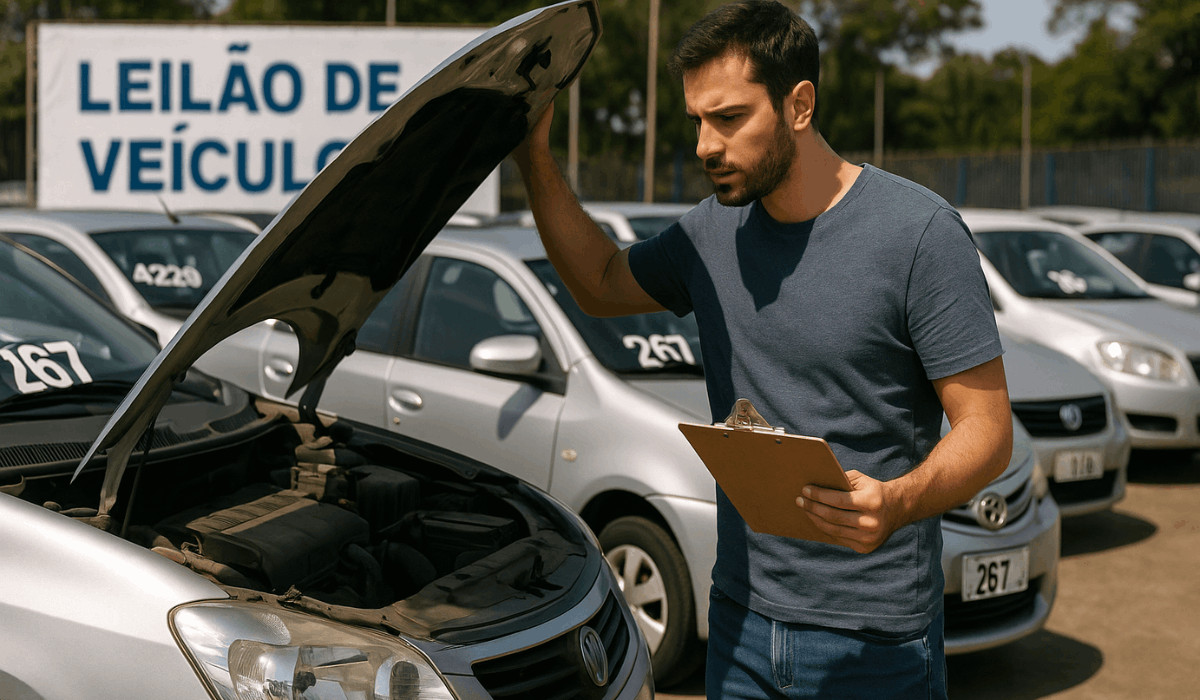Car auctions in Brazil have become a practical way to buy vehicles at lower prices.
They attract both individuals and businesses looking for affordable, well-maintained cars.
Understanding how the process works helps you make informed decisions and avoid costly mistakes.
Understanding Car Auctions in Brazil
Car auctions in Brazil are events where vehicles are sold to the highest bidder, usually organized by authorized auction houses.
They can be public, private, or online, depending on the organizer and the type of vehicles offered.
Anyone with proper identification and registration can participate, including individuals, dealers, and companies.

Step-by-Step Guide: How the Process Works
Buying a car through an auction follows a specific process that ensures transparency and fairness.
Each stage—from registration to vehicle transfer—requires attention to detail. Below is a step-by-step guide explaining how car auctions in Brazil typically work.
- Registration and Eligibility – Sign up online or in person using your CPF, RG, and proof of address, and agree to the auction’s rules.
- Vehicle Inspection – Review photos, reports, or visit the site to check the car’s mechanical condition and the Detran record.
- Bidding Process – Participate in live or online auctions by placing incremental bids until the final price is set.
- Winning the Auction – If you win, you must confirm payment within the deadline and follow the house’s payment terms.
- Vehicle Payment and Transfer – After making the payment, handle fees, taxes, and document the transfer through Detran to obtain the vehicle title and release.
Common Types of Cars Sold
Car auctions in Brazil include different types of vehicles, each with its own pricing and condition.
Understanding these categories helps you choose wisely and avoid surprises. Below are the most common types of cars sold at auctions.
- Bank Repossessions – Cars taken back by banks due to unpaid loans, usually in good condition, and offered at reduced prices.
- Insurance Recoveries – Vehicles recovered after accidents or theft may need repairs, but are legally cleared for sale.
- Fleet and Company Cars – Used by corporations or rental companies, typically well-maintained with regular service history.
- Government Vehicles – Sold after replacement cycles, often with verifiable maintenance records.
- Private Owner Vehicles – Sold voluntarily through authorized auction houses, varying in condition and mileage.
Pros and Cons of Buying at Auction
Buying a car at auction can be rewarding, but it comes with both benefits and risks.
Understanding the pros and cons helps you decide if this method suits your budget and experience.
Below is a balanced look at the main advantages and disadvantages.
Advantages
- Lower Prices – Cars often sell for less than market value, offering significant savings.
- Wide Selection – Access to vehicles of different brands, models, and conditions in one place.
- Quick Purchase – The buying process is faster than traditional dealerships.
- Transparent Bidding – Auctions are regulated and operate under clear rules.
Disadvantages
- Limited Inspection – You can’t always test drive or thoroughly inspect the car before bidding.
- No Warranty – Vehicles are sold “as is,” with no guarantees on condition.
- Immediate Payment – Buyers must pay quickly after winning, often within one or two days.
- Possible Repairs – Some vehicles may need mechanical or bodywork after purchase.

Tips for First-Time Buyers
If you’re joining a car auction for the first time, preparation is key. Knowing what to do before and during the event helps you avoid mistakes and overspending.
- Here are practical tips to guide first-time buyers through the process.
- Set a Budget Limit – Decide the maximum amount you’re willing to spend, including fees and taxes, and stick to it.
- Research Market Prices – Compare vehicle values on websites like FIPE to understand fair prices before bidding.
- Inspect Before You Bid – Check photos, reports, or visit the yard to assess the car’s real condition.
- Read the Auction Catalog – Review vehicle descriptions, lot numbers, and payment deadlines carefully.
- Attend a Few Auctions First – Observe how bidding works before participating with real money.
- Understand the Terms – Read all auction rules about fees, payments, and transfer responsibilities.
Who Should Consider Buying at Auction
Car auctions aren’t suitable for everyone, but they can be an excellent option for certain types of buyers.
Knowing whether this method fits your goals and experience level is essential before placing any bids.
Below are the profiles of people who should consider buying at auction.
- Experienced Buyers – Those familiar with car values, repairs, and paperwork can spot real bargains easily.
- Mechanics and Auto Professionals – Skilled individuals who can assess vehicle conditions and handle minor repairs themselves.
- Resellers and Dealers – People looking to buy multiple vehicles at lower prices to resell for profit.
- Budget-Conscious Buyers – Individuals aiming to save money by taking advantage of discounted prices.
- Fleet Managers or Small Business Owners – Those needing multiple vehicles for operations can find affordable options.
What Happens After Winning the Auction
Winning a car at auction is just the start. You must complete payment, manage documents, and transfer ownership. Here’s what happens next in Brazil.
- Payment Confirmation – Pay the total bid amount and required fees within one to two business days to confirm your purchase.
- Invoice and Documentation – Receive the invoice (nota fiscal) and required transfer documents from the auction house.
- Vehicle Release – Once payment clears, schedule the pickup or delivery of the vehicle from the auction site.
- Ownership Transfer – Complete the ownership transfer at your local Detran office, paying transfer and registration fees.
- Inspection and Repairs – Inspect the car after delivery to ensure it’s in expected condition and perform any needed maintenance.
Auction Fees and Extra Costs
The final cost at a car auction includes more than your bid. You’ll need to cover extra fees and taxes. Here are the main ones to expect.
- Administrative Fee – A mandatory charge paid to the auction house for handling documentation and logistics.
- Auctioneer’s Commission – Usually a small percentage of the final bid, added automatically to your payment.
- Transfer and Registration Fees – Costs for transferring the vehicle ownership at Detran and updating the registration records.
- Taxes (IPVA and Others) – Outstanding taxes like IPVA, DPVAT, or fines must be cleared before completing the transfer.
- Inspection or Storage Fees – Some auction houses charge for post-sale vehicle inspection or extended storage beyond the pickup date.
- Repair and Maintenance Costs – Budget extra funds for mechanical or cosmetic repairs after you receive the vehicle.
Legal and Safety Precautions
Buying at a car auction in Brazil requires attention to legal and safety checks. Verifying the auction’s legitimacy prevents scams and hidden issues.
Here are key precautions every buyer should follow.
- Buy Only from Authorized Auction Houses – Ensure the auction is registered with Detran or linked to a trusted bank or insurer.
- Check Vehicle Background – Use official databases to verify if the car has outstanding fines, theft records, or liens.
- Review Auction Terms – Read the auction’s legal terms carefully, including payment rules, deadlines, and liability clauses.
- Verify the Website’s Authenticity – Confirm that the website’s address starts with “https” and belongs to a trusted domain to avoid fraudulent sites.
- Confirm Vehicle Documentation – Ensure the car has valid CRLV and ownership records before completing the transfer.
- Avoid Third-Party Intermediaries – Make payments only through official auction channels to prevent fraud or loss.
To Sum Up
Car auctions in Brazil offer a smart way to buy vehicles at competitive prices if you know the process.
With preparation and attention to legal details, you can make safe and profitable purchases.
Start exploring trusted auction platforms today to find the best deals and make your first confident bid.









